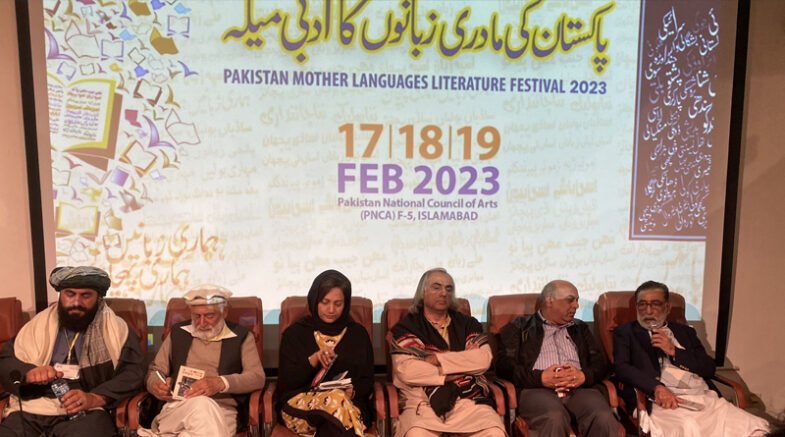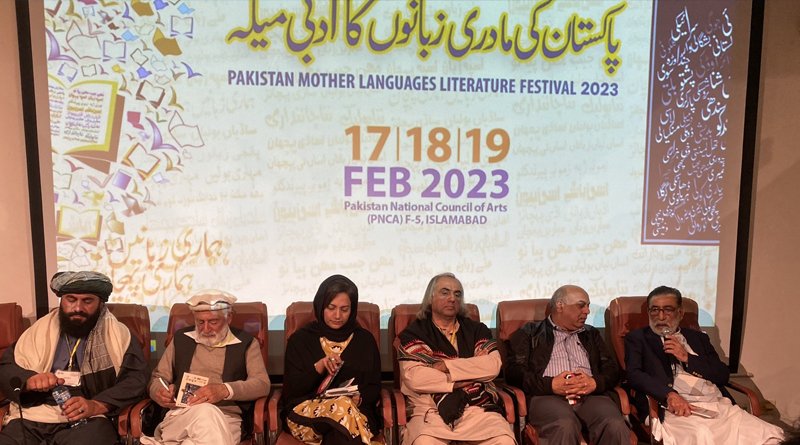“Pakistan Mother Languages Literature Festival,” which lasted three days, has grown into one of the key components of the literary and cultural landscape of the federal capital.

In the last eight years, the “Pakistan Mother Languages Literature Festival,” which lasted three days, has grown into one of the key components of the literary and cultural landscape of the federal capital.
The festival was organized by the Indus Cultural Forum in cooperation with the Pakistan National Council of the Arts (PNCA), a volunteer organisation made up of literary and cultural enthusiasts according to a news release.
The Friedrich Nauman Foundation (FNF), Forum for Language Initiatives, Idara Brae Taleem-o-Taraqi (IBT), Sindhi Language Authority, ECO Science Foundation, Society for Alternative Media and Research, and the cultural departments of the governments of Sindh and Balochistan provinces all contributed to the festival’s success.
At the closing ceremony, Indus Cultural Forum Chairman Dr. Manzoor Hussain Soomro said that the festival’s eight-year journey, which was undertaken voluntarily and with modest funding, is proof that we can accomplish a lot when we put in the time, effort, and enthusiasm necessary to do so.
To maintain such initiatives, he urged greater cooperation between the government and other institutions. The festival, according to ICF General Secretary Ashfaq Hussain Chandio, is a fantastic way to connect individuals from various language communities.
During these three days, he claimed, writers, artists, poets, and activists exchange ideas and creative works that are further developed throughout the year and serve as the foundation for friendships and collaborations that last for years.
The greatest strength of the nation, according to senior ICF member Munawar Hassan, is its diversity of languages, which ought to unite people rather than drive them apart.
In his remarks, PNCA Director General Muhammad Ayub Jamali stated that organisations like PNCA were willing to work with civil society organizations. The PNCA’s mission includes the promotion of the nation’s linguistic, artistic, and cultural diversity.
An education policy centred on children’s cognitive abilities to learn effectively in their mother tongue at the primary level and gradually move to other languages was advocated earlier in the day by the speakers.
To make room for learning in the mother languages, Zubair Torwali, Aftab Ahmed, Ameer Haider, Inamullah Shaikh, Shahid Rahman, and others called for a review of current educational policies and practises. Books about alternative history were released in a different session.
Naseer Memon, Panah Baloch, Aasma Shirazi, Muddassir Bashir, Aamir Mugheri, and Molana Khanzeb Khan argued that the true history of Pakistan was distorted in textbooks and that younger generations were deprived of their right to know objective realities.
They suggested that history books should consider different and diverse accounts of languages, cultures, and regions of the country and find common threads that unite Pakistan in a natural and organic way.
A session was dedicated to “River Indus: A Confluence of Economy, Language, and Culture” with a screening of a documentary by the Friedrich Nauman Foundation titled “Expedition Indus 2022.” Country Director of FNF Pakistan, Birgit Lamm, introduced the documentary, and speakers said that when a river dies, the whole civilization dies with it.
Nine prominent writers of different languages were awarded lifetime achievement awards for their lifelong dedication and contribution to the literature, languages, and culture of Pakistan.
They included Amar Jalil (Sindhi), Fatima Hassan (Urdu), Salma Shaheen (Pushto), Sharif Shad (Pothohari), Dr. Fazl Khaliq Baloch (Balochi), Sarwat Muhiudin (Punjabi), Dr. Muhammad Saghir Khan (Pahari), Dr. Abdul Rahman Brahui (Brahui), and Muhammad Irfan Irfan (Khowar).
